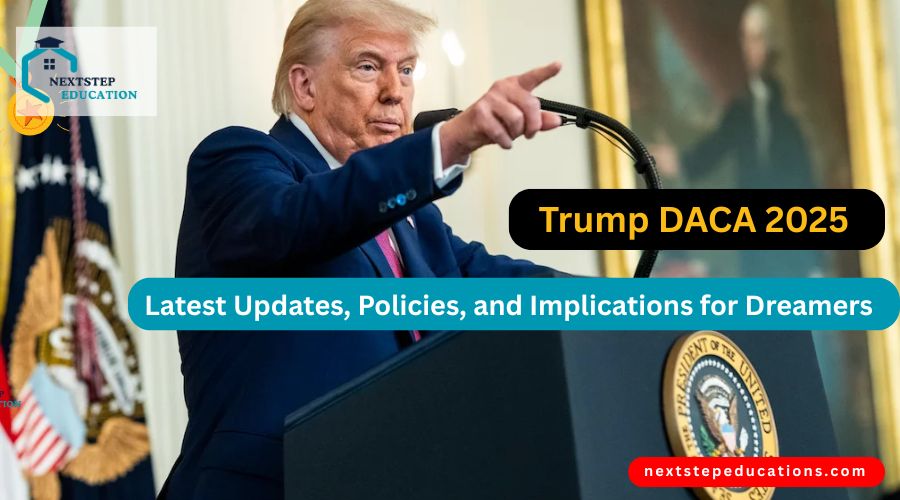The Deferred Action for Childhood Arrivals (DACA) program has long provided protections to hundreds of thousands of young immigrants, often called “Dreamers,” who were brought to the United States as children. However, under the Trump administration, DACA has faced unprecedented challenges. Recent statements and actions suggest that protections for DACA recipients could be significantly reduced, raising concerns among students, families, and immigrant advocacy groups.
In this article, we’ll take a closer look at Trump’s DACA policies, what they mean for recipients, and how lawmakers and advocacy organizations are responding.
Background on DACA
What is DACA?
The Deferred Action for Childhood Arrivals program, established in 2012, allows certain undocumented immigrants who came to the U.S. as children to receive temporary protection from deportation and eligibility for work permits. DACA is not permanent legal status but provides Dreamers the opportunity to live, study, and work in the U.S. without fear of immediate deportation.
Purpose and Benefits:
-
Protects eligible recipients from deportation.
-
Grants access to work authorization, allowing recipients to pursue careers.
-
Offers educational opportunities, including eligibility for in-state tuition in some states.
-
Provides a sense of stability and security for Dreamers and their families.
Why It Matters:
DACA has become a lifeline for hundreds of thousands of young immigrants. Any changes to the program directly affect education, employment, and long-term stability.
Recent Developments Under the Trump Administration
Under Trump DACA policies, several significant changes and statements have raised concerns for Dreamers across the country.
Policy Shifts:
Recent moves by the Trump administration have signaled a tightening of DACA protections. For example, officials have encouraged recipients to “self-deport,” creating uncertainty for those relying on the program for work and education. These actions suggest a systematic effort to reduce the scope and impact of DACA, leaving many Dreamers unsure about their future in the U.S. (source).
Statements from Officials:
Tricia McLaughlin, assistant press secretary at the Department of Homeland Security, recently made remarks implying that DACA recipients might need to leave the country voluntarily. Such statements contradict previous assurances and have caused widespread confusion among students and immigrant communities.
Contradictory Messages:
The administration’s stance on Trump DACA has not been entirely consistent. While some officials indicate strict enforcement, others suggest a more lenient approach, highlighting the ongoing uncertainty surrounding the program’s future.
Impact on Public Discourse:
These developments have intensified national debates on immigration reform and brought Trump DACA policies to the forefront of political discussions, affecting both legislative priorities and community advocacy efforts.
Implications for DACA Recipients
The changes under Trump DACA policies have far-reaching consequences for recipients, impacting their legal status, education, and overall well-being.
Legal Uncertainty:
Dreamers face heightened anxiety as the administration signals reduced protections. With the possibility of self-deportation encouraged and potential policy rollbacks, recipients are left navigating an uncertain legal landscape that threatens their ability to remain in the U.S.
Impact on Education:
Many DACA recipients are students pursuing higher education. Changes to Trump DACA policies can affect eligibility for financial aid, in-state tuition, and access to scholarships, creating additional barriers to academic advancement.
Employment and Career Opportunities:
Work authorization granted under DACA allows Dreamers to pursue careers, internships, and professional growth. Restrictive Trump DACA policies could jeopardize these opportunities, impacting long-term career prospects for young immigrants.
Social and Emotional Effects:
Beyond legal and educational consequences, uncertainty around Trump DACA creates stress, fear, and mental health challenges. Families and communities also experience anxiety as they face the potential disruption of lives built over decades.
Responses from Advocacy Groups and Legislators
The recent actions under Trump’s DACA policies have sparked strong responses from advocacy organizations, lawmakers, and community leaders.
Advocacy Efforts:
Groups such as the American Civil Liberties Union (ACLU) and United We Dream have stepped up legal support, public awareness campaigns, and lobbying efforts to protect DACA recipients. These organizations continue to challenge restrictive policies in court while providing resources to help Dreamers navigate uncertainty.
Legislative Responses:
Several lawmakers have introduced bills aimed at safeguarding DACA protections, emphasizing the importance of permanent legal status for Dreamers. Congressional leaders have voiced opposition to the administration’s attempts to chip away at DACA, highlighting the critical role of legislative action in securing immigrant rights.
Public Opinion:
Polls indicate widespread public support for DACA, with many Americans advocating for protections for Dreamers. The debate over Trump DACA has intensified public discourse on immigration reform, emphasizing the human impact behind policy decisions.
These responses reflect a growing push to counteract restrictive measures and ensure that Dreamers continue to have opportunities to live, work, and study in the United States.
Potential Future Developments
The future of Trump DACA policies remains uncertain, with several possible scenarios that could affect Dreamers in the coming months and years.
Legal Challenges:
Courts may play a pivotal role in shaping the outcome of DACA protections. Ongoing lawsuits could either block restrictive measures or uphold changes, directly influencing the legal status of Dreamers and the scope of Trump DACA policies.
Legislative Actions:
Congress could intervene by passing legislation to provide permanent protections or citizenship pathways for DACA recipients. Lawmakers from both parties have proposed bills aiming to safeguard Dreamers, though political divisions make the process complex.
Administrative Changes:
Future administrations may reverse or reinforce current policies. While the Trump administration has pursued a restrictive approach, upcoming leaders could restore or expand DACA protections, highlighting the program’s dependence on executive priorities.
Community Preparedness:
Advocacy groups continue to prepare recipients for potential policy shifts, offering guidance on legal rights, documentation, and alternative options to maintain stability under uncertain conditions.
The path forward for Trump DACA will likely involve a combination of legal, legislative, and administrative developments, making it crucial for Dreamers to stay informed and engaged.
Conclusion
The future of DACA under the Trump administration remains uncertain, and the stakes for Dreamers are higher than ever. Trump DACA policies have introduced legal ambiguity, threatened educational and employment opportunities, and created significant emotional stress for recipients and their families.
While advocacy groups, lawmakers, and communities continue to fight for protections, the path forward depends on a combination of legal decisions, legislative action, and potential administrative changes. Staying informed, engaged, and proactive is essential for Dreamers navigating this challenging landscape.





